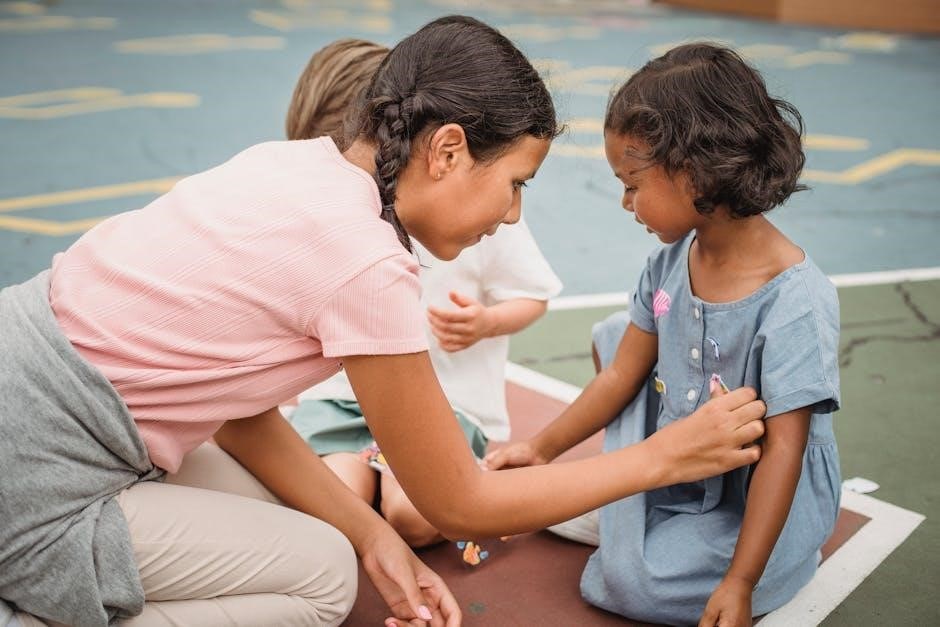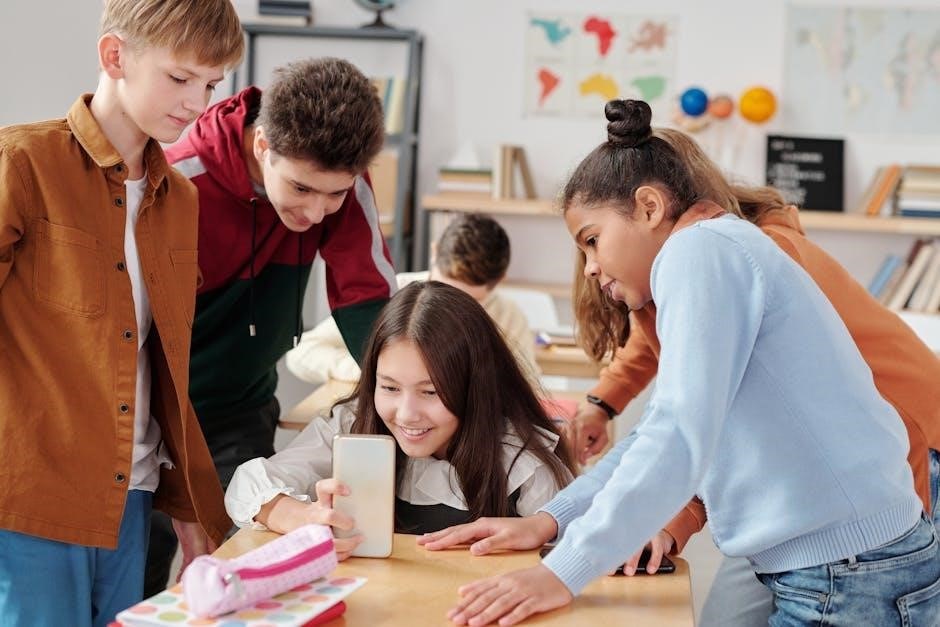social-emotional learning activities pdf

Social-emotional learning (SEL) is a vital approach to education, fostering essential life skills like self-awareness, self-management, and social awareness. SEL activities help students manage emotions, set goals, and build strong relationships, creating a foundation for academic success and personal growth.
1.1 Definition and Importance of SEL
Social-emotional learning (SEL) is the process through which individuals acquire essential life skills, including self-awareness, self-management, and social awareness. It enables students to understand and manage emotions, set positive goals, and develop empathy. SEL is crucial for fostering positive relationships, responsible decision-making, and academic success. By integrating SEL into education, schools help students become resilient, empathetic, and prepared for future challenges. Its importance lies in creating a supportive environment where students can thrive socially, emotionally, and academically, leading to improved behavior and overall well-being.
1.2 The Role of SEL in Education
Social-emotional learning plays a pivotal role in education by creating a supportive classroom environment that enhances academic performance. SEL activities reduce anxiety, improve focus, and promote collaboration among students. By fostering skills like empathy and self-management, SEL helps students navigate social dynamics and build positive relationships. Educators use SEL to address diverse student needs, ensuring each child develops holistically. This approach not only boosts academic achievement but also prepares students for future challenges, making it an essential component of modern education systems.

CASEL’s Five Core Competencies of SEL
CASEL’s framework outlines five key competencies: self-awareness, self-management, social awareness, relationship skills, and responsible decision-making. These skills form the foundation for holistic student development and emotional intelligence.
2.1 Self-Awareness
Self-awareness is the ability to recognize and understand one’s emotions, values, and strengths. Activities like journaling, emotional ID exercises, and reflection tasks help students identify and manage their emotions. These practices encourage self-reflection, enabling individuals to understand their thoughts and behaviors better. By fostering self-awareness, students gain insight into their personal motivations and goals, laying the groundwork for emotional regulation and personal growth. This competency is foundational for developing other SEL skills, as it helps individuals understand themselves before engaging with others.
2.2 Self-Management
Self-management involves regulating emotions, thoughts, and behaviors to achieve goals and handle stress effectively. Activities like mindfulness practices, deep breathing exercises, and end-of-day reflections help students manage impulses and emotions. These strategies teach individuals to stay focused, prioritize tasks, and maintain self-control in challenging situations. By mastering self-management, students develop resilience, enabling them to navigate setbacks and maintain a positive mindset. This competency is crucial for academic success and personal well-being, as it equips individuals with tools to cope with stress and make thoughtful decisions.
2.3 Social Awareness
Social awareness is the ability to understand and empathize with others’ feelings, perspectives, and needs. It fosters a sense of connection and respect, enabling individuals to build positive relationships. Activities like group discussions, role-playing, and kindness exercises help students develop this skill. By engaging in tasks that promote perspective-taking, students learn to appreciate diversity and address bias. Social awareness also encourages active listening and cooperation, creating an inclusive environment where everyone feels valued. This competency is essential for resolving conflicts and fostering empathy in both academic and real-world settings.
2.4 Relationship Skills
Relationship skills empower students to communicate effectively, build trust, and strengthen connections with others. Activities like collaborative games, group projects, and role-playing exercises encourage active listening, conflict resolution, and teamwork. These skills help students navigate social dynamics, express emotions clearly, and demonstrate empathy. By fostering positive interactions, relationship skills enhance students’ ability to work in teams and maintain healthy, respectful friendships. These competencies are vital for creating supportive learning environments and promoting long-term social success.
2.5 Responsible Decision-Making
Responsible decision-making equips students to make thoughtful choices by considering consequences and ethical implications. Activities like problem-solving tasks, scenario discussions, and reflective journals help students evaluate information, weigh options, and act responsibly. These practices foster critical thinking, self-reflection, and a sense of accountability. By learning to make informed decisions, students develop the ability to navigate challenges responsibly, contributing to their personal growth and positive community impact. This competency is crucial for preparing students to handle real-world dilemmas with confidence and integrity, ensuring they become ethical and responsible individuals.
Classroom Activities for SEL Development
Classroom activities for SEL development include group discussions, role-playing, and mindfulness practices. These exercises foster empathy, communication, and emotional well-being while encouraging reflective learning.
3.1 Group Discussions and Reflections
Group discussions and reflections are powerful SEL activities that encourage students to share thoughts and feelings. These sessions foster empathy, communication, and understanding. Teachers can guide conversations on topics like emotions, social scenarios, or classroom challenges, helping students develop self-awareness. Reflections allow students to process experiences, gaining insights into their behaviors and relationships. Such activities promote a supportive classroom environment, enhancing collaboration and emotional intelligence while preparing students for real-life interactions and decision-making.
3.2 Role-Playing and Empathy-Building Exercises
Role-playing and empathy-building exercises are effective SEL activities that help students understand different perspectives. By acting out real-life scenarios, students practice social skills like cooperation and conflict resolution. Activities such as “Acts of Kindness” or “Disgusting Team Sandwich” encourage collaboration and empathy. These exercises also allow students to explore emotions and behaviors in a safe environment, fostering deeper connections and improved relationships. Through role-playing, students develop the ability to see situations from others’ viewpoints, enhancing their emotional intelligence and social competence.
3.3 Mindfulness and Emotional Regulation Practices

Mindfulness and emotional regulation practices are essential SEL activities that help students manage stress and emotions. Techniques like deep breathing, guided meditations, and reflection exercises teach students to stay present and calm. These practices enhance self-awareness, allowing students to recognize and control their emotions. Regular mindfulness activities improve focus, reduce anxiety, and promote a positive classroom environment. By integrating these practices into daily routines, students develop resilience and emotional well-being, becoming better equipped to handle life’s challenges effectively.

Home-Based SEL Activities
Home-based SEL activities, such as family chats and gratitude practices, foster emotional intelligence and bonding. Parents can use collaborative games and affirmations to nurture social-emotional growth in children.
4.1 Family SEL Chats
Family SEL chats are structured discussions that encourage open communication about emotions, values, and social interactions. These conversations help children develop self-awareness, empathy, and relationship skills. Parents can initiate chats by asking open-ended questions, such as “How did you feel today?” or “What was a kind thing someone did for you?” Reflecting on experiences fosters emotional intelligence and strengthens family bonds. Activities like sharing gratitude or discussing challenges also promote self-reflection and responsible decision-making, aligning with CASEL’s core competencies. Regular SEL chats create a supportive environment for emotional growth and understanding.
4.2 Positive Affirmations and Gratitude Practices
Positive affirmations and gratitude practices are powerful tools for fostering emotional well-being. Families can use affirmations like “I am capable and confident” to promote self-esteem. Gratitude practices, such as sharing three positive experiences daily, encourage mindfulness and social awareness. These activities help children develop a positive mindset, build resilience, and strengthen relationships. Incorporating these practices into daily routines supports emotional growth and aligns with CASEL’s competencies, creating a nurturing environment for personal development and social-emotional learning.
4.3 Collaborative Games for Emotional Intelligence
Collaborative games are effective for fostering emotional intelligence by encouraging teamwork and empathy. Activities like “Acts of Kindness” and “Alphas and Omegas” promote social awareness and cooperation. These games help children understand different perspectives, enhancing their ability to connect with peers. By working together, participants develop essential relationship skills and emotional regulation.
Games such as “Disgusting Team Sandwich” and “Marshmallow Challenge” stimulate creativity while teaching collaboration. These engaging activities align with CASEL’s framework, nurturing emotional intelligence and social competence in a fun, interactive manner.

SEL Games for Different Age Groups
SEL games are tailored for various age groups, promoting emotional intelligence through age-appropriate challenges. These activities foster empathy, self-awareness, and decision-making skills, supporting holistic development.
5.1 Games for Elementary School Students
Games for elementary students focus on fostering empathy, cooperation, and emotional recognition. Activities like “Feelings Charades” and “Empathy Mapping” encourage children to express and understand emotions. “Sharing Circle” promotes kindness and connection, while “Emotion Bingo” helps identify and discuss feelings. These engaging games are designed to be fun and educational, teaching young students essential social-emotional skills in an interactive way. They align with CASEL’s core competencies, ensuring a strong foundation for emotional intelligence and interpersonal relationships.
5.2 Activities for Middle and High School Students
For older students, activities focus on advanced social-emotional skills like conflict resolution and empathy. Role-playing scenarios and group discussions on real-life dilemmas encourage critical thinking and moral reasoning. Peer mediation training and collaborative problem-solving tasks foster leadership and teamwork. Reflection journals and self-assessment exercises help students analyze their emotions and behaviors. These activities are designed to meet the developmental needs of adolescents, promoting emotional intelligence and preparing them for complex social interactions. They align with CASEL’s competencies, ensuring a comprehensive approach to SEL.
5.3 Age-Appropriate Challenges and Puzzles
Age-specific challenges and puzzles are designed to enhance problem-solving and critical thinking while fostering social-emotional skills. For younger students, activities like matching emotions to scenarios or solving simple logic grids build foundational skills. Older students engage in complex puzzles that require collaboration and empathy, such as decoding teamwork exercises or ethical dilemmas. These activities align with CASEL’s competencies, promoting self-awareness, relationship skills, and responsible decision-making in a fun, engaging manner. They cater to diverse developmental stages, ensuring meaningful learning for all ages.
Assessment and Progress Tracking in SEL
Assessment tools and progress tracking in SEL help measure skill development and identify growth areas. Regular feedback and reflections guide improvements, fostering continuous social-emotional development effectively.
6.1 Tools for Measuring SEL Skills
Various tools measure SEL skills, including worksheets, surveys, and rubrics. These resources assess competencies like self-awareness and relationship skills, providing insights into student progress. SEL workbooks offer structured exercises to evaluate emotional intelligence and decision-making abilities. Online surveys and reflection activities help gauge social awareness and empathy. Teachers use these tools to track growth and identify areas needing improvement. Rubrics align with CASEL’s framework, ensuring comprehensive assessment. Emotional ID games and social scenario discussions are also used to measure skills, guiding instruction and supporting student development effectively.
6;2 Student Reflections and Self-Assessment
Student reflections and self-assessment are key components of SEL, fostering self-awareness and personal growth. Activities like journaling or end-of-day reflections encourage students to identify emotions and actions. Visual representations, such as emotional ID charts, help students articulate feelings. Reflection questions prompt students to evaluate their learning and behavior, recognizing strengths and areas for improvement. These practices empower students to set goals, fostering accountability and self-directed learning.
6.3 Feedback Mechanisms for Improvement
Feedback mechanisms play a crucial role in SEL development, enabling students to refine their social-emotional skills. Educators use structured tools like SEL chats and reflection exercises to provide constructive feedback. Students engage in peer reviews and self-assessments, fostering accountability and growth. Visual representations and journals allow educators to track progress and offer tailored guidance. These mechanisms encourage open communication, helping students understand their strengths and areas for improvement, while promoting a supportive learning environment.